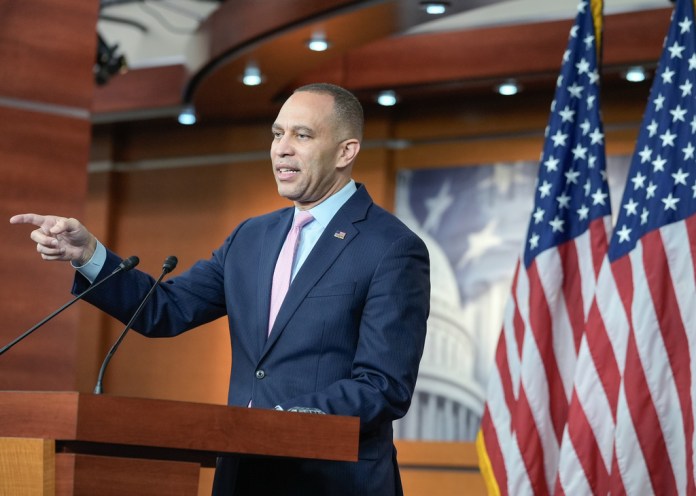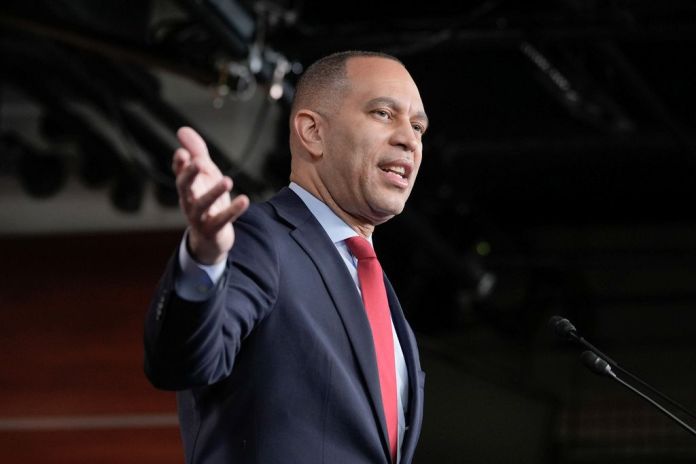Member security funds delay deal to avoid government shutdown
The article discusses a delay in passing a government funding bill in the U.S. House of Representatives due to disagreements over enhanced security funding for lawmakers and members of the executive and judicial branches. This issue has gained urgency following the recent assassination of Charlie Kirk and previous attacks on lawmakers. House speaker Mike Johnson indicated that a three-month continuing resolution (CR) will include security funding, but the exact amount is still under negotiation.
The proposed CR aims to avoid a government shutdown, which is scheduled for September 30, the end of the fiscal year. The additional security funding currently provided to members is set to expire then. Johnson emphasized the importance of protecting government officials but noted that security enhancements woudl be costly and require bipartisan agreement.
There is some GOP opposition to the CR, and Democratic leaders are unwilling to support the bill without healthcare-related concessions such as extending Obamacare premium tax credits.Despite pressure from figures like former President Donald Trump to keep the government open, the partisan divide and internal GOP disagreements complicate timely approval.
Senate Republicans are prepared to act quickly once the House passes the bill,perhaps staying in session over the weekend. Failure to pass the funding by the deadline would lead to a partial government shutdown, affecting federal services and public access to national parks and museums.
Government funding bill delayed as House looks to work in member security provision
Funding enhanced security for lawmakers has emerged as a sticking point in Congress as members work to approve a short-term spending deal, a week after the assassination of Charlie Kirk.
House Speaker Mike Johnson (R-LA) said Monday that money for security for lawmakers and the executive and judicial branches will be included in a three-month continuing resolution to fund the government, giving the chamber more time to pass all 12 mandatory appropriations bills.
He said the Trump administration’s $58 million request for security increases for the executive and judicial branches is a “late, breaking development.”
“We have to protect our judges and those who serve in those two branches, but also, of course, in Congress,” Johnson said. “And so we’re looking at an amount that would be appropriate for a continuing resolution in the short term to protect members in the [legislative] branch, as well.”
He said there is no consensus yet on a dollar amount for increasing funding for member security. He expects to chat with members on both sides of the aisle over the next two days, “and we’ll determine what everyone believes is appropriate.”
After Kirk was shot and killed at a public event held at Utah Valley University last week, members’ concerns for their own safety also pushed Johnson to move forward with a planned review of member security that began after two Minnesota Democratic lawmakers were shot earlier this year.
With a government shutdown looming on Sept. 30, and a recess scheduled for next week, time is running out for House Republican leadership to construct and present the GOP conference with a continuing resolution that will garner lawmakers’ support.
Timing for a CR passage is critical, as the $5,000 a month provided to members in the wake of the assassination of Minnesota House Speaker Melissa Hortman is expiring on Sept. 30, the end of the fiscal year.
Under the GOP’s 72-hour rule, Johnson would need to release text tomorrow if Republicans wanted a vote on a CR this week, as the rule gives members 72 hours to read bill text, particularly for contentious legislation.
House Appropriations Committee Chairman Tom Cole (R-OK) said on Monday that he’s waiting for the member security provision to be shored up before finalizing the bill text and releasing it to members.
“I told our leadership, whatever you give me, we’ll put in the bill,” Cole told Punchbowl News.
If the text does not come out tomorrow and Johnson adheres to the 72-hour rule, a vote on the continuing resolution will likely not happen until Sept. 29, at the earliest, one day before the government shutdown deadline.
Several members last week expressed that they were reevaluating their outdoor events. Rep. Tim Burchett (R-TN) accused GOP leadership of being “woefully ill-prepared” regarding member security.
“I just think they’re surrounded in their little protective bubble and they look at us — I mean, it’s been weeks after the last incident before we ever got anything … It’s just ridiculous,” Burchett said. “They take leadership, but they don’t take us serious.”
Johnson said Monday that granting members additional security will be “costly” and noted that members “are safe.”
“They will be kept safe. They have security measures now at their residences, and personally. We can always enhance and do more and do better, and I think everyone’s looking at that soberly right now after this unspeakable tragedy,” Johnson said.
With the thin margins and Democrats unlikely to provide votes without healthcare concessions, Johnson can only afford to lose two GOP votes and still pass a spending deal along party lines.
Four Republicans are currently opposed to a three-month CR. Other than Rep. Thomas Massie (R-SC), holdouts are known to cave after facing pressure from the White House and House leadership.
President Donald Trump is already lobbying Republicans on the spending deal, urging that the party needs to “stick TOGETHER.”
“Democrats want the Government to shut down,” Trump wrote. “Republicans want the Government to OPEN. …FAILURE IS NOT AN OPTION.”
Democratic leaders do not appear open to assisting Johnson in pushing this over the finish line. House Minority Leader Hakeem Jeffries (D-NY) said that House Democrats will “not support a partisan spending bill that continues to gut the healthcare of the American people.”
Jeffries and Senate Minority Leader Chuck Schumer (D-NY) said last week that they want to see a provision to extend the Obamacare premium tax credits and address the reforms to Medicaid made in the “big, beautiful bill.”
Republican leaders seem uninterested in extending the Affordable Care Act subsidies at this time, despite centrist GOP lawmakers like Rep. Jen Kiggans (R-VA) pushing for their renewal.
Meanwhile, Democratic leaders have presented a unified front, for now, though it is possible that some centrist Democrats such as Reps. Jared Golden (D-ME), Marie Gluesenkamp Perez (D-WA), Henry Cuellar (D-TX), and Vicente Gonzalez (D-TX) could cross party lines and vote for the short-term spending plan.
Republicans in the Senate are preparing for the legislation to come their way. Senate Majority Leader John Thune (R-SD) told reporters Monday that the Senate could stay in session this weekend to pass the CR if the House can get it done.
SCHUMER AND JEFFRIES IN LOCKSTEP AS DEMOCRATS SEARCH FOR NATIONAL LEADER
“I’d like to get it, if we get it from the House, get it done this week before we leave,” Thune said.
If the spending legislation isn’t passed by Sept. 30, the government would enter into a partial government shutdown on Oct. 1, which would mean a temporary reduction in government services and essential employees working without pay. National parks, as well as national museums such as the Smithsonian, would be closed to the public.
" Conservative News Daily does not always share or support the views and opinions expressed here; they are just those of the writer."




